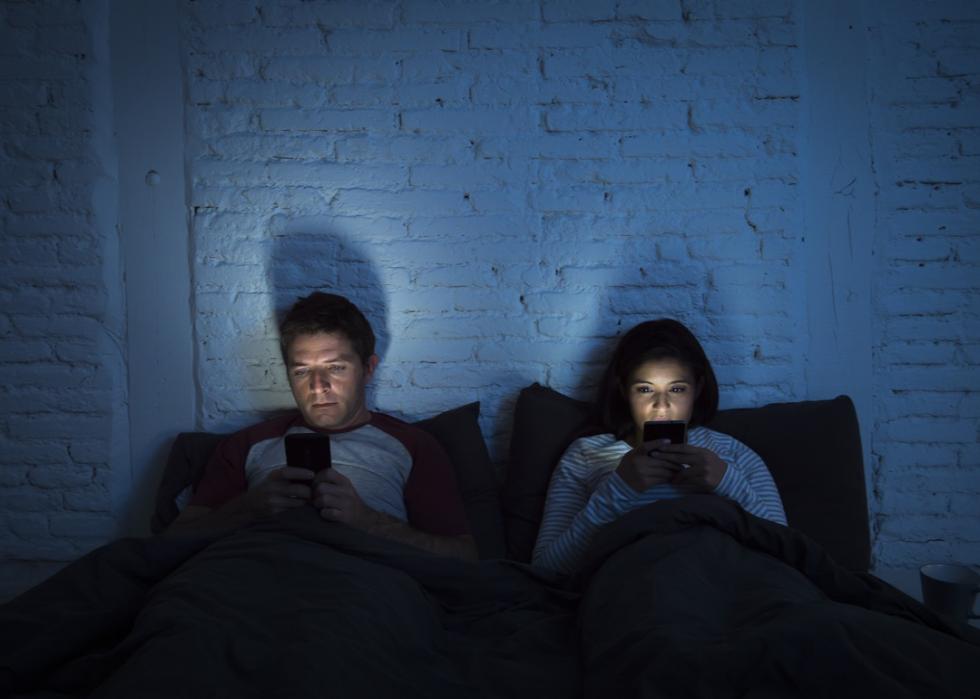
How burnout affects Americans—and what they do to cope with it
This story originally appeared on Stacker and was produced and distributed in partnership with Stacker Studio.
How burnout affects Americans—and what they do to cope with it
Burnout is an increasingly hot topic in American discourse. The coronavirus pandemic has exacerbated issues many workers, in particular, were already facing. These include increased amounts of time tethered to work by email and smartphones, and a lack of work-life balance, most prominently manifested in the stresses endured by working parents trying to juggle family and work responsibilities at the same time with no school or office bound respite from either during the pandemic.
All of these conditions can also lead to workers leading unhealthy lifestyles while trying to juggle all of their responsibilities and external pressure, such as having poor diets or not enough sleep, which can decrease energy and cause additional health concerns. However, these conditions that create burnout—defined as prolonged stress that leads to negative mental and physical health symptoms—predated the pandemic by years, if not decades.
To understand what might be behind burnout and its impact, Moment conducted a survey that examined how Americans are affected by burnout and how they cope with it. In this survey, burnout is defined as chronic stress or exhaustion that is characterized by continual lack of energy, negative feelings toward work and other responsibilities, and reduced efficiency or motivation for doing daily tasks.
The survey consisted of seven questions that were asked to 1,000 respondents across different ages and backgrounds in the United States using Google Surveys. The survey was conducted from June 18 to July 16. The results were combined with research from scientific publications such as SAGE Journals and health news such as Healthline to provide information on the history of burnout, as well as causes, notable symptoms, coping mechanisms, and other solutions for people experiencing burnout. Please note that for some of the questions, respondents were allowed to pick more than one answer.
Read on for a look at what burnout is, who it impacts and how, and what might be done to alleviate its symptoms.

Burnout rates have accelerated in recent decades because of modern-day lifestyle and stress
Burnout is a relatively recent phenomenon. The term was coined in the 1970s by psychologist Herbert Freudenberger to describe chronically stressful conditions that can cause severe mental, physical, and emotional health problems. While stressful conditions such as caring for a sick family member or working long hours have existed for most of human history, the prevalence of sustained stressful experiences has accelerated in recent decades. Divorce rates have increased, health care and support have become increasingly unaffordable, and people are working longer hours than ever before. All of these pressures may lead to burnout.

More than 50% of respondents experience some symptoms of burnout every month.
Over half of survey respondents said they experience some symptoms of burnout each month, with 33% of people experiencing symptoms at least half of the month, and 11% of respondents experiencing burnout all the time. People whose jobs do not come with clear boundaries and those who lack social support may be more susceptible to burnout. Those whose professions are centered around taking care of others also tend to have higher rates of burnout. This includes doctors, teachers, and lawyers. Those whose jobs are less stable also report more burnout, including retail and fast food workers.

Everyday responsibilities and lack of time for self-care are the largest causes for burnout
- What factors contribute to your burnout?
--- Responsibilities at work or school: 55%
--- Lack of time for self-care or relaxation: 43%
--- Family or household responsibilities: 32%
--- Leading unhealthy lifestyle: 19%
--- Romantic or friendly relationships: 14%
Overwhelming responsibilities was the clear leading cause of burnout among survey respondents. The second-most factor was a lack of time for self-care or relaxation, which is a likely related response to overwhelming responsibilities. Technology is thought to play a significant role in burnout. In the case of many workers, smartphones and email have created an expectation that they will be available to perform their job at all hours of the day and night. This further chips into their time for relaxation and self-care, and may also make handling family or household responsibilities—the third-most common cause of burnout—more difficult. A notable cause of burnout is also leading an unhealthy lifestyle, which can impact both personal and professional responsibilities and make them more stressful. Turning to substances, unhealthy food and drinks, and a sedentary lifestyle can be tempting ways to combat stress and burnout but will in turn have negative effects on one's wellbeing, mindfulness, and ability to engage in consistent self-care that can help prevent symptoms of burnout.

Burnout takes a mental toll with constant exhaustion, brain fog and poor sleep quality
- When you are experiencing burnout, what are some effects you’re feeling?
--- Constant exhaustion: 53%
--- Moodiness: 49%
--- Lower quality of sleep: 48%
--- Brain fog: 43%
--- Losing interest in work and relationships: 37%
--- Change in appetite: 21%
Burnout takes a physical and mental toll. Effects of burnout include stress, fatigue, exhaustion, disillusionment; numbing with alcohol, food, or drugs; and loss of interest in otherwise meaningful intimate relationships. Burnout can even come with physical symptoms, including digestive issues and headaches. Perhaps the most insidious symptom is the lowering of sleep quality, which almost half of respondents reported feeling. Despite being exhausted—the most common symptom—people experiencing burnout have trouble staying and falling asleep, which contributes to a cycle of exhaustion.

Increased stress levels from burnout can affect all aspects of life, from relationships to work
- How has burnout affected your life?
--- Increased feelings of stress: 61%
--- Negative impact on my health: 40%
--- Having trouble staying alert: 32%
--- Negative impact on my family or friends: 31%
--- Negative impact on my job or education: 26%
The consequences of these mental and physical effects of burnout are wide ranging. Although social support can be a bulwark against burnout, it’s been found that burnout often has the effect of negatively impacting people’s relationships with family and friends. Ironically, almost a fourth of respondents said their performance at work and at school has been impacted negatively by burnout, which many respondents attributed to their increased responsibilities and expectations at work and school. But the feeling of stress itself was by far the most common reported effect. Stress has numerous documented consequences, including depression, anxiety, high blood pressure, diabetes, and asthma.

40% of people use self-care to prevent burnout
- What preventive measures do you use to manage burnout?
--- Engaging in self-care: 40%
--- Improving sleep quality: 34%
--- Spending time with friends and family: 32%
--- Taking time off from work or school: 30%
--- Managing my or others’ expectations: 20%
--- Consulting a therapist: 10%
There is a profound irony in many of the strategies that people report using in an attempt to address burnout. Many of them, such as engaging in self-care, improving sleep quality, and spending time with family and friends, are precisely the activities a lack of time and the pressure of work or school responsibilities prevented them from pursuing. Therefore, one of the most useful strategies for preventing burnout may be the ability to set boundaries. Boundaries—whether with oneself or with an employer—might look like dedicating certain hours of the day to relaxation, turning off email at a certain hour, and setting a non-negotiable date night with a partner.
Once boundaries are established, it can be helpful to set routines and habits that improve one's lifestyle so that person will have more energy to dedicate to things that can help them prevent burnout. Small changes such as healthy and nutritious additions to one's diet, eating and sleeping at consistent times each day, and allocating time for taking short walks or doing another form of exercise can help alleviate certain stress caused by the pressures people feel in their daily lives.

Depending on the cause, different actions can be taken to lessen burnout.
- What things do you feel you need to help lessen the impact of burnout on your life?
--- Not taking on as many responsibilities: 44%
--- Better work pay, hours, or responsibilities: 40%
--- More structure in daily life: 31%
--- Access to a social support system: 20%
--- Better or increased medical care: 19%
--- Change in family or friend dynamics: 17%
If burnout is a state of overwhelm, it makes sense that taking on fewer responsibilities is the #1 answer people gave when asked what they would need to lessen the impact of burnout. While some people may voluntarily take on too many responsibilities, others within the corporate world have looked at whether they are asking employees to do too much, and giving them too little time off. As a result, companies from Bumble to Mozilla are giving employees more paid time off. Increased medical care was another factor cited as potentially game-changing for burnout. One potential reason? Access to a therapist might help some people set boundaries.

Self-care and improving sleep quality are the most popular ways of coping with burnout
Many of the best ways to treat burnout are concrete physical self-care actions. Exercise has been shown to decrease stress and anxiety that many people report feeling as a result of burnout. Eating a nutritious diet has been found to help with low energy and fatigue, which is also a burnout symptom. Researchers have been studying the best way to incorporate these self-care routines into one's lifestyle, and there are a number of web-based programs and applications that can help reduce burnout, improve mindfulness, and even help make easy changes to diet or sleep that individuals can keep track of and hold themselves accountable.
These activities are management of symptoms, however, and not necessarily treating the root causes of burnout. For those looking to stem the problem of burnout at the source, talking to a therapist who might help identify these causes, set boundaries, and take action could be an excellent course of action. With teletherapy becoming more prominent during the pandemic, it is now easier for users to find a professional that can work for them and help them make important lifestyle changes, even when they are stuck at home or feel overwhelmed by all of their responsibilities.

COVID-19 caused an increase in burnout for 44% Americans because of heightened stress levels
The coronavirus pandemic positively or negatively impacted burnout in 53% of the individuals surveyed, and of that number, the vast majority reported feeling increased burnout due to COVID-19. Many parents in particular reported increased levels of stress during the pandemic trying to manage their childcare responsibilities and work responsibilities without ever having the time alone needed while children normally were at school. Conversely, about 7% reported having burnout decrease due to the coronavirus. One reason may be decreased commute times while people worked from home, as long commute times can lead to burnout.
This story originally appeared on Moment and was produced and distributed in partnership with Stacker Studio.



